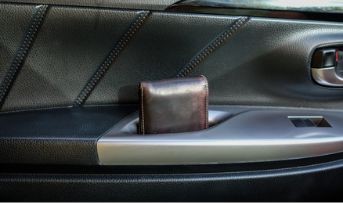General Insurance Blogs, Articles & Updates by - Magma HDI
Have us call you
- RENEW YOUR POLICY
- BUY NEW POLICY

Practice these steps to best deal with motion sickness while driving
If you feel dizzy while driving where the roads are primarily like pins, you are not the only one. Many car drivers feel the sensation of wooziness and motion sickness during a long journey, and it can be a nightmare.
What if you end up crashing your car due to dizziness? This thought might have crossed your mind. It is natural to feel uneasy while driving, especially for long hours. Due to continuous motion, your brain might feel fatigued, and as a result, you may get distracted. These distractions can be fatal for you and your car.
Even if you buy car insurance online that will cover your damage, what about the injuries you will face? In this post, we'll give you some advice on reducing the effects of motion sickness while driving.
1. Keep an eye on your diet:
Be careful about what you eat before you drive because your food can greatly impact motion sickness. Avoid eating anything that makes you feel full. Eat light an hour before because you won't feel heavy while driving. The problem might worsen if you eat spicy foods. Therefore, be sure to eat small meals, and it's best to avoid any items that don't suit your taste. A proper food regimen can significantly reduce symptoms of motion sickness.
2. Check your driving position:
Sit comfortably and keep your eyes on the horizon while you are driving. By doing this, you divert your attention from moving items. Even though you need to be aware of your surroundings, try to avoid looking sideways while driving. It is because sudden and severe nausea might occasionally result from looking sideways. If you can, keep the windows open when operating a four-wheeler since a steady stream of fresh air can help with motion sickness.
3. Check the ventilation and cooling:
Many people avoid AC and prefer natural air. If your car's cooling system isn't sound, it can create driving problems. It could end up being one reason for dizziness or motion sickness. Similarly, poor ventilation in cars is another frequent cause of motion sickness while driving. It may result in some odors being trapped, which may make you nauseous.
It is therefore advised to keep your car well-ventilated by slightly lowering the windowpanes. A calming scent in your vehicle, like mint or lavender, is also a good idea because it can help boost your mood and prevent motion sickness symptoms.
4. Enjoy breaks:
Driving for long stretches can also cause motion sickness. So, if you are on a long-distance trip, it is a good idea to stop frequently. When you reach a restaurant or rest area, stop your car for a short while, get out, and stretch your legs. Taking regular breaks helps a lot with motion sickness symptoms. Also, if you feel sick while driving, stop immediately, splash some water on your face, and don't get back behind the wheel until the sickness is gone.
5. Drink tea:
If you are a tea lover, have it when taking a journey break. Tea can treat motion sickness by calming and relaxing the muscles in your stomach and can lower the amount of acid in your stomach.
6. Carry medicines:
There are over-the-counter medications that can give you immediate relief from motion sickness. However, always speak with your doctor before using such medication. You should only take these drugs as prescribed by your doctor.
Motion sickness is a common problem, but you must take appropriate steps to overcome the problem while driving. Bring the above tips into practice, and you will surely find a good solution. The effects of motion sickness can be adverse, and with time if you feel that the situation is worsening, you must see your doctor for further diagnosis.
If you are going on a long drive for the first time, ensure that you have already taken a good rest. Also, buy car insurance online as an excellent option to cover any damages that might occur during your trip. By purchasing online car insurance, you unlock features and benefits like instant coverage, better premium, and 24/7 customer support to safeguard your car from mishaps.
Click HERE to buy car insurance online.
Disclaimer: The information provided above is for illustrative purposes only. To get more details, please refer to policy wordings and prospectus before purchasing a policy.

The best anger management ways to tame your temper
We have been hearing for a long time that anger is human’s greatest enemy! Before going for the strategies of anger management, it is worth knowing more about anger. It is a mental state that makes a person say or do something unusual. Anger can be seen as an ego outburst and can also arise from a hormonal problem. It is even believed to be the aftermath of high body toxicity.
Extensive anger can lead to various medical complications, if not controlled in time. For example, it raises blood pressure; thus, it can be extremely dangerous if you have pre-existing heart disease or diabetes.
There are many reasons for getting angry, and so are the solutions. In this blog, we shall discuss the best and most effective ways of anger management.
Anger Management Techniques:
Different techniques work for different people. While some people adopt simple techniques, many must adopt complex anger management processes depending upon the severity of getting angry. Like any other psychological issue, anger is also complicated. As stated, these are some of the basic techniques that are suggested to be tried.
● Exercise:
Studies have shown that many people benefit from exercise to keep anger and stress at bay. Daily exercise, brisk walking, running, or bike rides can prevent anger. These exercises uplift your mood and make you calm down.
● Write down your problem:
Instead of showing rage toward others, you may write your thoughts on a piece of paper and vent out all your anger by peacefully transforming it into words. This method will surely help in effective anger management.
● Going for a walk: Going for a walk is one of the most effective strategies for anger management. The morning atmosphere remains calm and soothing due to lesser vehicles and noises. You will obtain excellent mental peace through morning walks and feel refreshed and energetic throughout the day. It is a proven fact that we become less angry when we are in a good mood.
● Counting breath:
When anger strikes, you should start counting your breaths. This is one of the most successful anger management ideas. Counting your breaths can help you reduce your anger, stabilise your breath, control your heartbeat and increase your concentration.
What makes you angry?
We have discussed a few of the best anger management ideas. But you must question yourself about what makes you angry or feel frustrated. You need to do a quick analysis and consider all possible reasons and situations. According to the research, people with frequent anger issues are vulnerable to heart-related diseases. So, in addition to considering all the factors to avoid anger, you should also procure health insurance from online health insurance companies.
Following are a few probable reasons that can trigger your temper:
● Insulting behaviour toward you
● Frequent noise
● Discussing mishaps or accidents
● Disagreement with you by anyone
● Workload
● Stress
● Mismanagement of tasks
Likewise, you must create a list of what you mostly do when you get angry. For example, some people tend to throw things away. Some people shout or scream when they get angry. For anger management, knowing these things is essential. You need to write down your plan for anger management. Writing a solution will help you make a fresh start toward peaceful well-being. By practicing it, you will be able to manage your boiling blood whenever you get angry.
Anger management is a systematic and time-consuming process that does not fetch results overnight. Build a routine to resolve anger issues and douse the fire before it damages your health and mental peace. As discussed, anger can adversely affect your health, especially your heart.
It is advised to find the best insurance by researching the different plans of online health insurance companies. If you feel your temper issues are slipping beyond your control, it is always a good idea to visit your doctor. Take the help of a professional and try to find a solution that suits you the best.
Click HERE to buy health insurance online.
Disclaimer: The information provided above is for illustrative purposes only. To get more details, please refer to policy wordings and prospectus before purchasing a policy.

The best first-aid tips to deal with kitchen accidents
No area in the house is immune to mishaps, and Kitchen accidents are undoubtedly the most common. There are several potential sources of injury in the kitchen, including sharp knives, hot appliances, and open flames. While it's impossible to eliminate risk, taking precautions can help mitigate it. Accidents can happen to anyone, whether they are awake or not.
When working in the kitchen, you need to be prepared for any emergency that may arise. If you plan beforehand for the worst, you can limit the damage. A personal accident insurance policy covers the costs if you get wounded in an accident and need medical care.
Moreover, you can avoid more serious injury by following these simple rules for kitchen safety and first aid.
First aid for knife cuts:
Accidents due to kitchen knives are common, but they require immediate first aid. If you cut or slice your finger, you should treat the wound using these tips:
● Clean the cut or slice area with soap and water. Apply pressure to it with a bandage or a clean cloth for a few minutes until the bleeding stops. If you bleed through the cloth, you can use another piece of cloth or use a cotton piece.
● Get the antibacterial ointment from your first aid kit and put it over the cut. Cover the wounded area with a gauze pad and adhesive tape.
● Get immediate medical help if the bleeding doesn't stop after a few minutes, the cut becomes inflamed or has jagged edges.
First aid for eye injuries:
Sometimes people accidentally shoot lemon juice or other substances straight into their eyes. If something gets in your eyes while cooking, you should follow these steps:
● Wash your eyes with lukewarm water for about 15 minutes. Protect your second eye by covering it.
● If you have a cut on your eye, don't apply pressure to it or wash it. Instead, call for medical help.
First aid for falls:
Water and oil can spill from the pot and make the floor slippery. Many people fall in the kitchen due to the slippery floor, so you should keep your kitchen floor clean and dry. However, if you still happen to fall in the kitchen, follow these tips:
● Try to get up in the right manner, or you could make your injury worse. Slowly rise to your hands and knees.
● Try to crawl to a nearby chair or preferably a wall and stand up.
● If you think you may have a broken bone or can't get up, don't move and call for help.
First aid for burns:
An accident due to boiling water or oil splashing while cooking is a severe accident. You should ensure that your children are away from the oven or stove when cooking. Turn the pot handles toward the back of the stove to prevent burns. However, if you have a burn, you must identify the type and follow the safety tips.
Different types of burns:
● First-degree burn:
If the top layer of your skin is injured, you can treat it by placing the burned area under cool, running water for five minutes.
● Second-degree burn:
If the deeper skin is injured, soak the injured area in cool water for 30 minutes and apply an antibiotic cream to it.
● Third-degree burn:
If all layers of skin are burned, apply a wet dressing and call for emergency medical help.
These first-aid tips will help you deal with kitchen accidents and prevent the condition from worsening. However, you should pay extra attention if you have children. Keep your children away from the oven, stove, microwave, knives, and anything that seems dangerous. Always wear an apron and gloves while handling sharp objects and hot utensils and working with boiling water or oil.
You can install smoke detectors in your kitchen to protect you from fire accidents. Also, purchase a personal accident insurance policy to recover from the major injuries faced in a kitchen accident to pay your medical expenses.
Click HERE to buy a personal accident insurance policy.
Disclaimer: The information provided above is for illustrative purposes only. To get more details, please refer to policy wordings and prospectus before purchasing a policy.

Here are a few items that you must never leave in your car
Buying a car was seen as a status symbol in the past. However, it has become a necessity over time. Considering the growing population, increasing traffic, and demand for luxury and convenience, cars have improved commutation in urban landscapes.
Most people spend long hours in their cars due to long-distance commutes. After completing the ride, remember a few items you should never leave in your vehicle.
1. Edibles:
It is natural to feel snacky during the day. Keeping snacks in your car for emergencies is a good idea, as long as you take them out when you exit the vehicle. When left for long hours, the food or drinks are subjected to the changing temperature inside the car, which may result in the growth of bacteria. The same applies to soda cans that have pressure within and may explode due to the external pressure from the car's cabin.
2. Aerosols:
Aerosols like hairsprays, deodorants, air fresheners, etc., are essentials. Keeping one in the car for short periods is acceptable. However, since the cabin's temperature keeps changing without artificial air conditioning when the car is not in use, you may find that your aerosol can has exploded all over your seats.
3. Plastic bottles:
Plastic bottles are a fire hazard to your car. It magnifies the sun rays pouring in through the windows or windshield and may result in setting your seats on fire. Such incidents are considered the owner's negligence and not covered by car insurance as admissible claims.
Even if the sun rays are not strong enough to ignite a fire, they will alter the composition of the plastic bonds in the bottle, which may result in harmful BPA exposure.
4. Flammable items:
Items like lighters must never be stored in cars. The fuel within such containers can expand due to the heat and result in a fire. Again, such fires are not within the scope of admissible car insurance claims. Therefore, it is essential to remember to remove flammable items from your car cabin.
5. Valuable goods:
While the other items on this list risk the car, valuable goods are what carjackers look for while determining which car to steal from. Ensure you take out any valuable goods like phones, headphones, portable chargers, laptops, and purses from your vehicle. Leaving an expensive item in the car makes it vulnerable to drawing the attention of burglars.
6. Items with specific chemical formulations:
Items like sunscreen and medication are scientifically manufactured with a specific composition of ingredients involving chemicals to ensure efficiency. Leaving such things in the heat will alter their formulation, making the goods toxic or causing a loss of efficacy.
7. Alcoholic drinks:
Heat leads to increased fermentation which ruins the flavour of alcohol. Additionally, alcoholic drinks are packaged with internal pressure to keep the liquor from altering while in transit before consumption. Excess heat is bound to make them explode.
While this list is not comprehensive, it is a general guideline for what you must not leave in the car. Generally, anything that may be affected due to high heat must not be kept inside the vehicle. Ensure that any important documents like your car insurance and registration are not left in the car. Take care of your valuables and avoid any considerable risks to your car.
Click HERE to buy the best car insurance in India.
Disclaimer: The information provided above is for illustrative purposes only. To get more details, please refer to policy wordings and prospectus before purchasing a policy.


